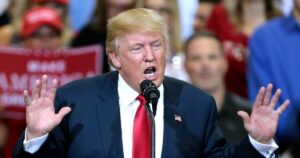Jennings Counters Kinzinger on Election Challenges
During a televised discussion, Jennings pointedly corrected Kinzinger's assertion that both major political parties have consistently accepted presidential election outcomes, citing Democratic objections to past Republican victories. The conversation showcased how, in recent history, Democrats have formally challenged electoral results, including those from the 2000, 2004, and 2016 presidential races.
Democrats' Historical Election Challenges Highlighted
In January 2001, Democratic representatives objected to certifying the results of the contentious 2000 election, where George W. Bush was ultimately declared the victor over Al Gore. During the certification process, Vice President Al Gore himself intervened to halt the objections, underscoring the high tensions surrounding the election.
Four years later, similar objections surfaced when Democratic Sen. Barbara Boxer and Rep. Stephanie Tubbs Jones of Ohio contested the certification of Ohio’s electoral votes during the 2004 election. Their move led to a vote in which thirty-two Democrats supported the measure, despite its subsequent failure.
The pattern continued into 2016 when seven members of the Democratic Party challenged the certification of Donald Trump's win. These actions highlighted a recurring theme of dissatisfaction and protest within the halls of Congress.
Republican Challenges Also Noted
In a similar vein, Republican objections arose during the 2020 election outcome. Notably, Ted Cruz and ten additional Republican senators voiced their discontent by objecting to the certification of Joe Biden's victory. This event set the stage for more intense scrutiny of election procedures and the broader political climate.
The dialogue between Jennings and Kinzinger also delved into distinctions and perceptions surrounding these challenges. Kinzinger asserted that the top Democratic leaders had not, in his view, objected to presidential elections, pointing to his belief in the significant differences in the nature and leadership of objections between parties.
Differences of Opinion on Objections
Jennings, countering Kinzinger's assertions, firmly stated that Democrats had previously objected, a point which appeared to be contentious but starkly illustrative of past practices. This exchange revealed the nuanced interpretations of political actions and the challenges faced in understanding precedents within the political sphere.
Despite the back-and-forth, the conversation emphasized an important aspect of American electoral history: the recurring nature of objections and their implications on the integrity and perception of the electoral process. Such challenges, although often procedural, play a significant role in shaping political narratives and public trust.
Electoral Certification Process Under Spotlight
The absence of formal challenges during the 2024 election certification marked a departure from the historical pattern discussed. This shift led to reflections on its significance in terms of political unity and the evolving attitudes towards accepting electoral outcomes.
These discussions between Jennings and Kinzinger raise relevant questions about the changing dynamics of political challenges and the interpretation of electoral events over time. The focal point remains on the potential impact these actions have on democracy.
Through this lens, the story of electoral objections underscores a broader dialogue about partisanship and the varied expressions of political dissent, providing insight into both historical context and future implications.
Conclusion and Reflection on Political Actions
As with many political stories, the details and interpretations of past objections continue to be sources of debate and discussion. This ongoing conversation reflects the complex nature of democracy and the role that objections play in highlighting political dissatisfaction and differing perspectives.
Overall, the dialogue between Jennings and Kinzinger is emblematic of the broader discussions that continue to shape electoral narratives and the interpretation of democratic processes. Their exchange over historical objections serves as a reminder of the importance of understanding political context and the nuances of electoral practice.




